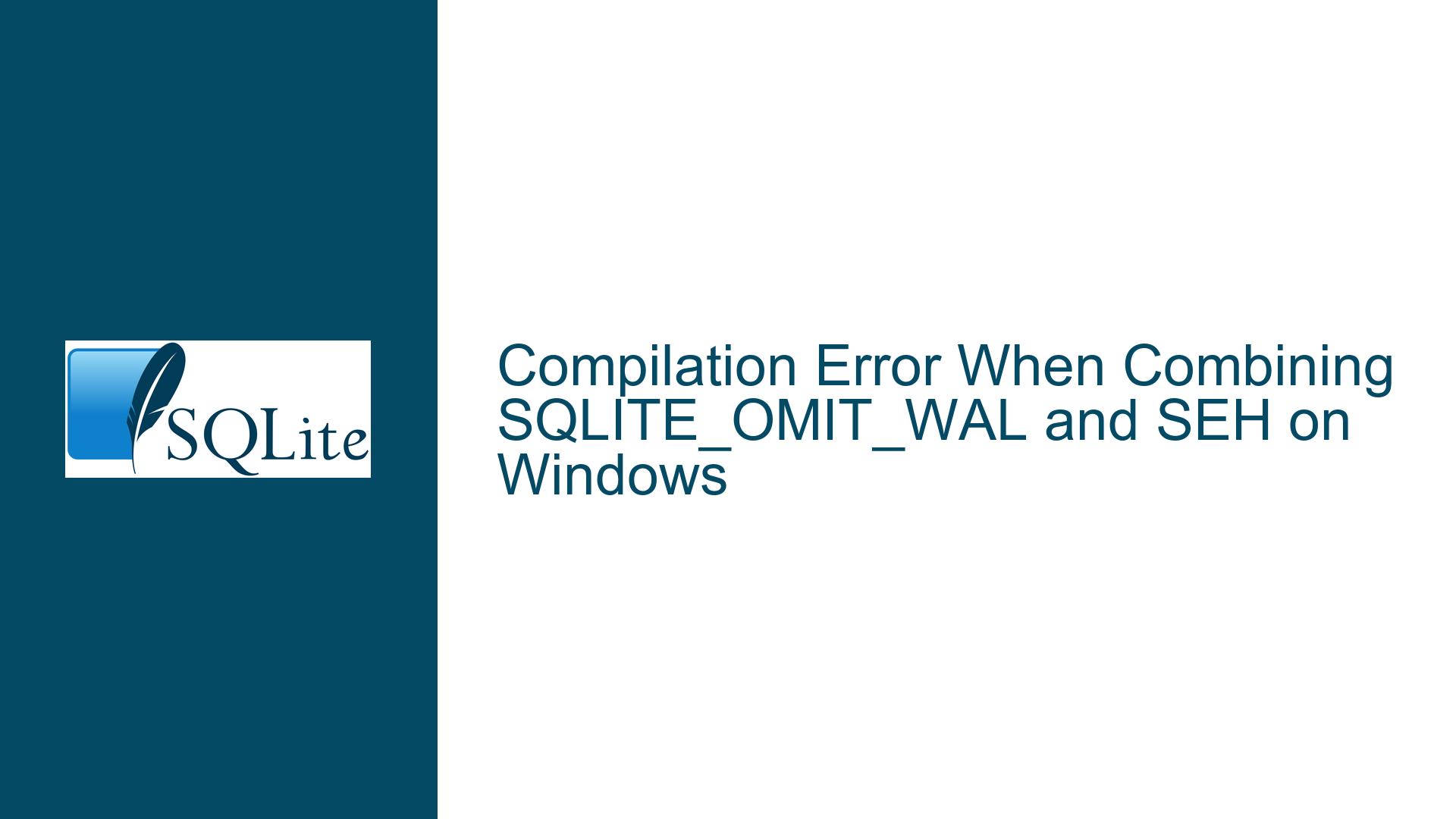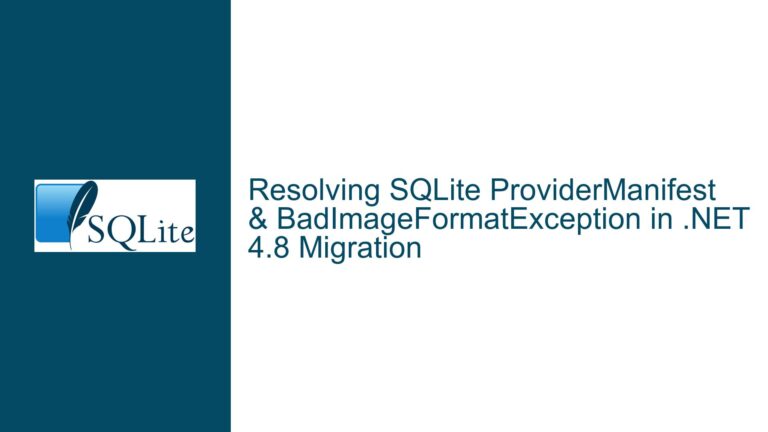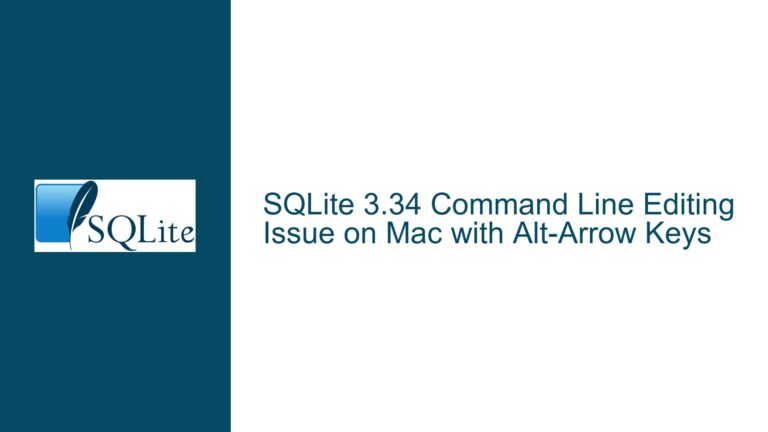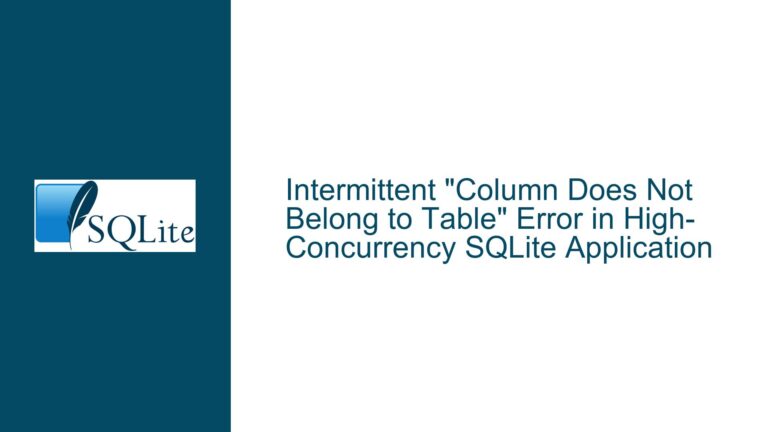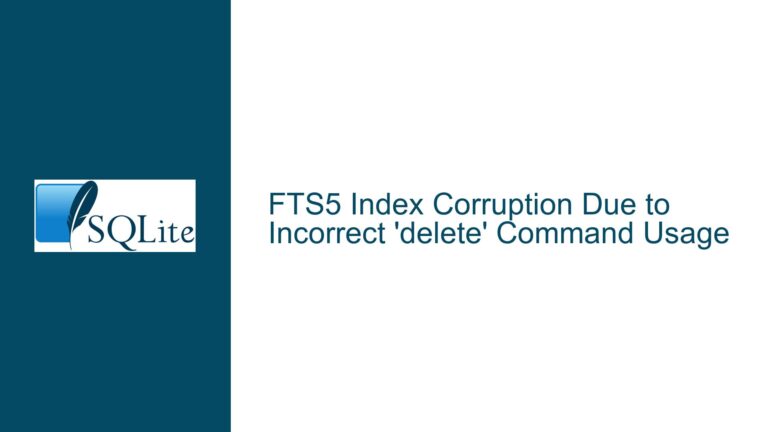Compilation Error When Combining SQLITE_OMIT_WAL and SEH on Windows
Compilation Failure Due to Undefined sqlite3PagerWalSystemErrno in SQLite 3.44.2
Issue Overview
A compilation error occurs when building SQLite 3.44.2 on Windows with the SQLITE_OMIT_WAL preprocessor flag enabled. The error manifests as a missing reference to the function sqlite3PagerWalSystemErrno, which is declared conditionally in the SQLite amalgamation source code. This function is part of SQLite’s pager module, which manages database page transactions. The error arises specifically in environments where:
- Write-Ahead Logging (WAL) is explicitly disabled via
SQLITE_OMIT_WAL, and - Structured Exception Handling (SEH) is implicitly or explicitly enabled via
SQLITE_USE_SEH.
The function sqlite3PagerWalSystemErrno is designed to propagate system-level error codes from the WAL layer to the pager module. Its declaration in sqlite3.c (line 34597) is guarded by the preprocessor directive:
#if defined(SQLITE_USE_SEH) && !defined(SQLITE_OMIT_WAL)
However, its sole usage in util.c is guarded only by #ifdef SQLITE_USE_SEH. When SQLITE_OMIT_WAL is defined, the function’s declaration is omitted, but its usage remains, leading to a compiler error (e.g., error C4013: 'sqlite3PagerWalSystemErrno' undefined).
This inconsistency stems from a mismatch in preprocessor guards introduced during SQLite’s codebase updates. The error impacts projects that embed SQLite’s amalgamation code and disable WAL while compiling under Microsoft Visual C++ (MSVC), which automatically enables SQLITE_USE_SEH unless explicitly disabled via SQLITE_OMIT_SEH.
Root Cause: Mismatched Preprocessor Guards for SEH and WAL Interdependencies
Possible Causes
The compilation failure is caused by conflicting dependencies between SQLite’s exception handling and transaction logging subsystems. Below are the technical factors contributing to this issue:
Inconsistent Guard Clauses for SEH and WAL
SQLite’s implementation of SEH relies on WAL-specific components when handling system errors. Thesqlite3PagerWalSystemErrnofunction acts as a bridge between the pager (transaction manager) and the WAL module. Its declaration was inadvertently made dependent on bothSQLITE_USE_SEHand the absence ofSQLITE_OMIT_WAL, while its usage only checks forSQLITE_USE_SEH. This creates a scenario where the function is referenced (in SEH-enabled builds) but not declared (if WAL is omitted).Implicit Enablement of SEH in MSVC Builds
SQLite automatically definesSQLITE_USE_SEHwhen compiled with MSVC unlessSQLITE_OMIT_SEHis explicitly set. This default behavior assumes SEH is desirable for robust error handling on Windows. However, when combined withSQLITE_OMIT_WAL, the implicit SEH enablement introduces an unsupported configuration: SEH’s dependency on WAL internals is not accounted for in the preprocessor logic.Interplay Between WAL and Pager Modules
The pager module depends on WAL-specific functions for certain error-handling workflows. Disabling WAL viaSQLITE_OMIT_WALremoves large portions of WAL-related code, including functions likesqlite3WalSystemErrno, whichsqlite3PagerWalSystemErrnowraps. The SEH implementation, however, does not respect theOMIT_WALflag when deciding whether to include error-handling paths that depend on WAL.Release-Timing Discrepancy in Code Updates
The SQLite 3.44.2 release included updates to SEH and WAL interaction that were partially but not fully reconciled. A subsequent patch (post-3.44.2) corrected the guard clauses to align declaration and usage ofsqlite3PagerWalSystemErrno, but this fix was not backported to the 3.44.x branch at the time of the user’s report.
Resolving the Build Error: Patching, Configuration Adjustments, and Workarounds
Troubleshooting Steps, Solutions & Fixes
To resolve the compilation error, developers must address the conflicting preprocessor flags or modify the SQLite amalgamation code. Below are actionable solutions, ordered by practicality and long-term maintainability:
1. Apply the Official SQLite Patch
The SQLite team provided a patch to align the guard clauses for sqlite3PagerWalSystemErrno. Apply this patch to the amalgamation code as follows:
- Locate the Declaration in
sqlite3.c:
Navigate to the declaration ofsqlite3PagerWalSystemErrno(line 34597 in the reported build). - Modify the Preprocessor Guard:
Change:#if defined(SQLITE_USE_SEH) && !defined(SQLITE_OMIT_WAL)to:
#ifdef SQLITE_USE_SEH - Verify the Function’s Usage in
util.c:
Ensure the single usage of this function is guarded by#ifdef SQLITE_USE_SEH.
This change decouples the function’s declaration from SQLITE_OMIT_WAL, ensuring it is available whenever SEH is enabled, regardless of WAL’s status.
2. Adjust Build Flags to Disable SEH
If patching the source is undesirable, disable SEH by defining SQLITE_OMIT_SEH alongside SQLITE_OMIT_WAL:
-DSQLITE_OMIT_WAL=1 -DSQLITE_OMIT_SEH=1
This prevents the compiler from including SEH-related code paths that depend on WAL. However, this approach sacrifices SEH’s benefits, such as detailed system error reporting and crash resilience.
3. Manually Guard the Function’s Usage
For projects that cannot disable SEH and must retain SQLITE_OMIT_WAL, modify the amalgamation to stub out or remove references to sqlite3PagerWalSystemErrno:
Add a Stub Implementation:
If SEH is required, provide a dummy implementation of the function:#ifdef SQLITE_USE_SEH int sqlite3PagerWalSystemErrno(Pager *pPager) { return 0; } #endifThis workaround suppresses the compiler error but may compromise error-handling accuracy.
Remove or Comment Out the Function Call:
Locate the usage ofsqlite3PagerWalSystemErrnoinutil.cand guard it with#if defined(SQLITE_USE_SEH) && !defined(SQLITE_OMIT_WAL).
4. Wait for a Patched SQLite Release
SQLite 3.45 or a hypothetical 3.44.3 release will include the corrected guards. Monitor SQLite’s changelog for updates.
5. Reevaluate the Use of SQLITE_OMIT_WAL
Disabling WAL forfeits its performance benefits, including concurrent reads and writes. If WAL is omitted for compatibility reasons, consider alternative configurations, such as using WAL in a restricted mode or employing a different journaling mechanism.
Conclusion
The compilation error arises from an unresolved dependency between SEH and WAL in SQLite’s source configuration. By patching the amalgamation, adjusting build flags, or reworking error-handling logic, developers can resolve the issue while balancing performance, compatibility, and robustness. For long-term stability, track SQLite’s release cycle for official fixes or reconsider the use of SQLITE_OMIT_WAL in Windows builds.
